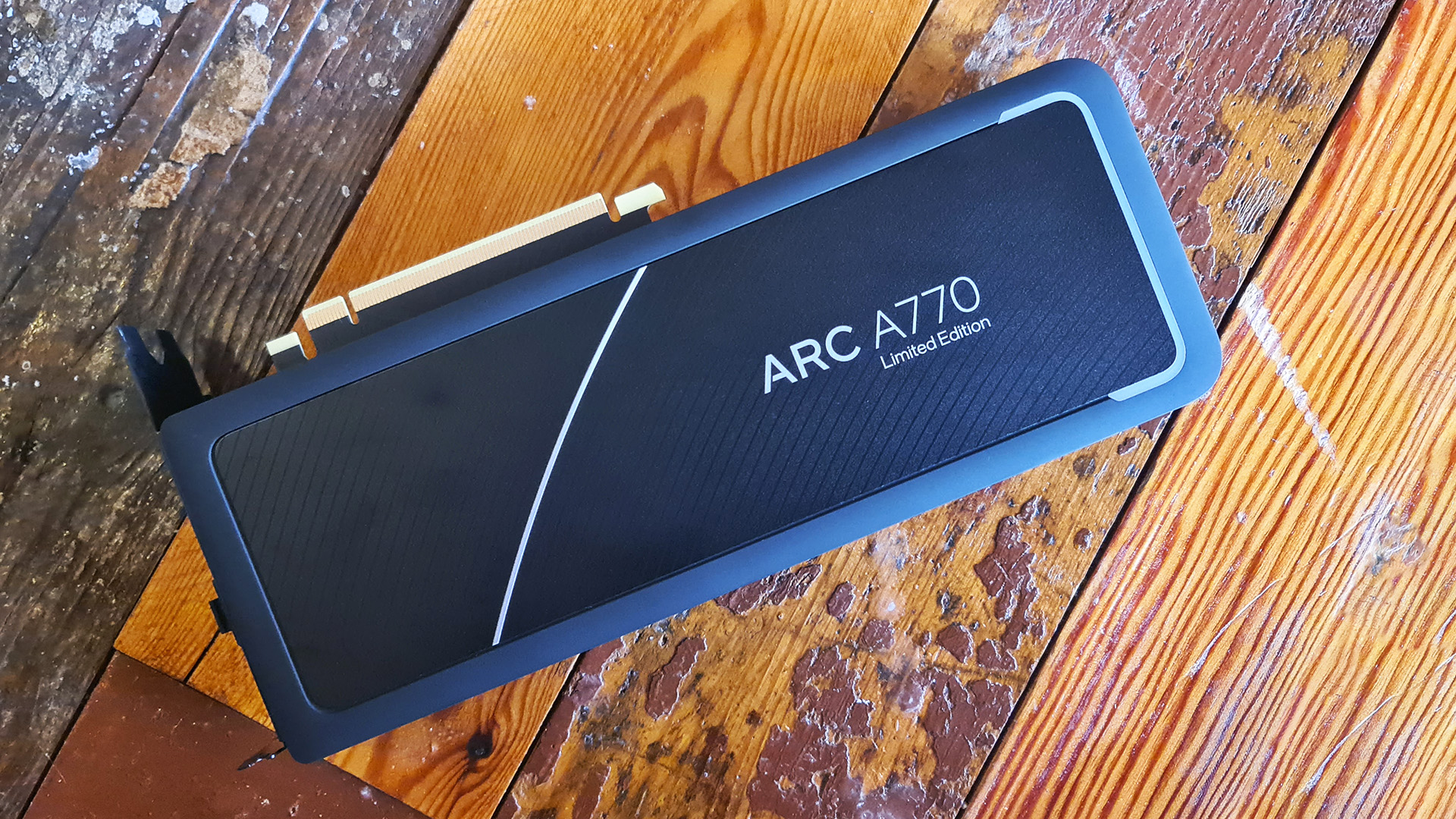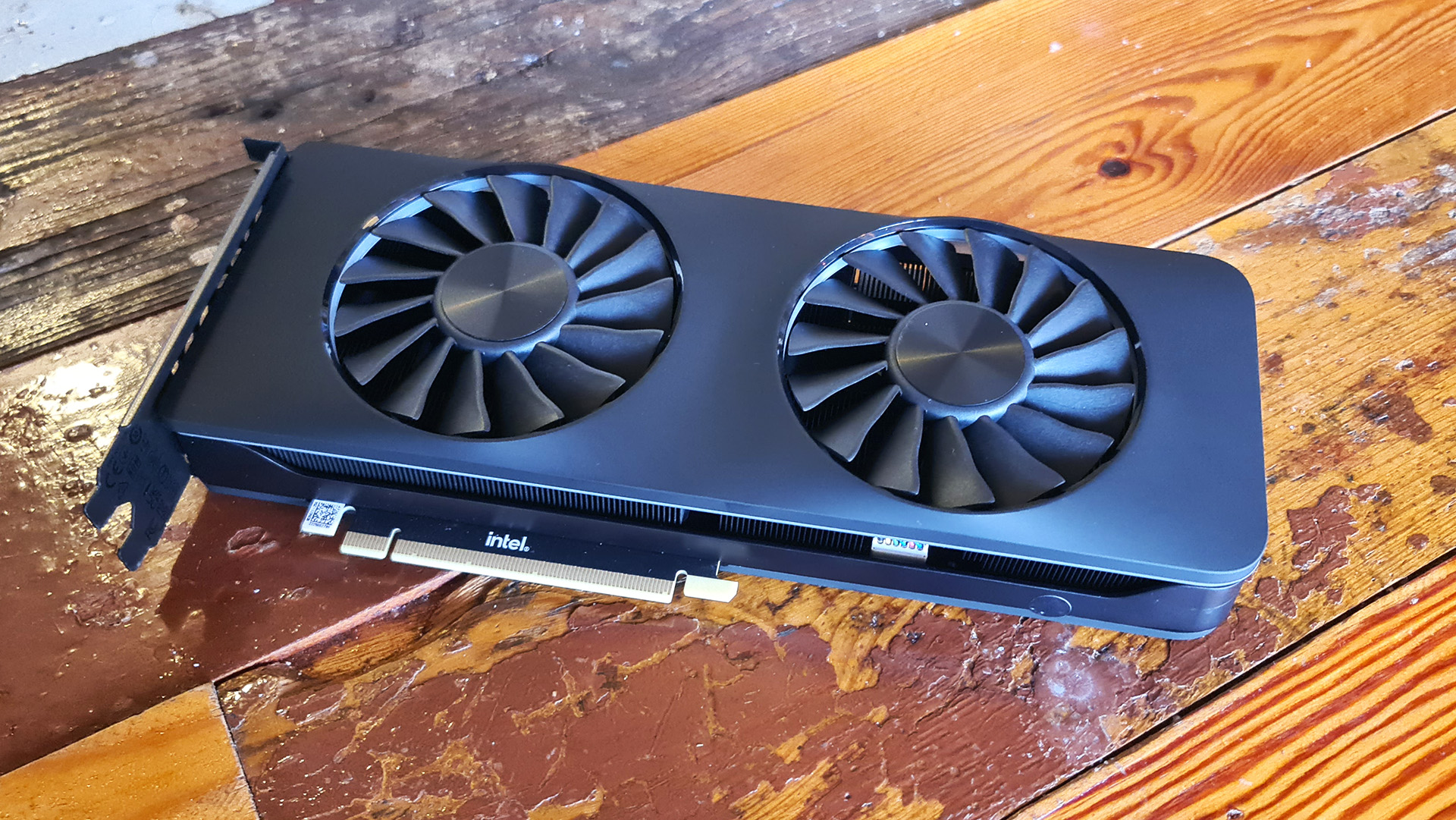Intel Arc will soon deliver 'a card that's faster than the [RTX] 3060 at prices that are lower'
For DX12 and Vulkan games, at least.

There are two Intel Alchemist graphics cards readying for imminent battle with Nvidia and AMD: the Arc A750 and Arc A770. The chip giant is targeting the green team's popular RTX 3060 12GB with both of these cards, and during a chat with Intel's technical marketing brass, Tom Petersen and Ryan Shrout, I'm told it's doing all it can to price them competitively enough to tempt PC gamers.
First off, the little matter of PC performance for the A750 and A770, which have been hotly contested and much rumoured about since Intel first announced its intention to get into gaming graphics.
Both the A770 and A750 utilise the same G10 GPU die. However, whereas the A770 comes with 32 Xe Cores, the A750 comes with just 28. That's not a major reduction in cores for the A750 but expect a modicum more performance from the A770.
"When you have a title that is optimised for Intel, in the sense that it runs well on DX12, you're gonna get performance that's significantly above an [RTX] 3060," Petersen says.
"And this is A750 compared to a 3060, so 17%, 14%, 10%. It's going to vary of course based on the title."
Vulkan API performance on the A750 and A770 should follow suit with DX12, I'm told, with both Nvidia and Intel fighting for wins but in "normalising we win a little bit."
"We're going to be a little bit faster but depending on your game and depending on your settings, it's trading blows, and that's the A750. Obviously A770 is going to be a little bit faster," Petersen continues.
Keep up to date with the most important stories and the best deals, as picked by the PC Gamer team.
With DX11 games, the A770 and A750 are less able to compete with the performance of an RTX 3060, however. That's not all too surprising, as Petersen and Shrout had already tempered expectations in that department, though essentially the messaging remains that DX11 driver optimisations are slower to come together than DX12 and Vulkan ones.
"So when you add in DX11, you're gonna see our performance is a little less trading blows, and we're kind of behind in some cases, ahead in some cases, but more losses than wins at DX11."
DX9 performance is also now to be handed off to Microsoft to take care of with its DX9 to DX12 mapping layer.
Ultimately it does appear as though Intel's more powerful Alchemist GPUs have fallen a rung or two down the ladder in terms of their rumoured performance. There was a time when Intel was said to have been targeting RTX 3070 performance with its 175W to 225W GPUs. For the Arc A770 Limited Edition in front of me during my chat, which could be pushed to 225W through an Intel GPU tuning utility, however, that sounds an idealistic target. Petersen and Shrout were certainly not making any comparisons to the RTX 3070.
It's to be a very competitive perf per dollar entry.
Tom Petersen
"I was hoping that we would be coming in with a little bit higher performance, but the truth is, this is where we are today," Petersen says candidly.
A750 and A770 performance will be subject to some degree of change over the coming months and years. At the very least in the terms of driver development and improvement on Intel's side, but also I suspect we'll get the best picture of these cards' true performance across a range of games once we get our hands on the card to benchmark for ourselves.
Intel sounds very confident in Arc's ray tracing performance, at least.
"The good news for consumers is that we're going to make sure that this product is very competitive."
There is an olive branch for gamers in what Intel deems a worthy price to charge for a card with, let's say, uneven performance depending on the game being played. Similarly, Intel appears aware that it needs to be doing something differently to drive sales away from the dominant companies in the market today in Nvidia and AMD.
"All of that is going to be factored into what is our introductory pricing," Petersen says.
"And so from my perspective, the gamer says, 'Okay, if I want to play DX12 right now, I'm gonna get an amazing value.' You're gonna get a card that's faster than 3060, at prices that are lower. If you think you're playing DX12 and DX11, and you're splitting it, you're still gonna get amazing value. Because we're gonna price it for the performance that we're delivering today.

"It's to be a very competitive perf per dollar entry."
While Intel admits that it's not quite a match for Nvidia in performance per watt (A750 ~190 watts versus RTX 3060 ~170 watts), it does hope to more than make up for it in terms of pricing. Intel recognises it's a new entrant into the market, and customers need some incentive to roll the dice on its fledgling GPUs.
Petersen wouldn't unveil the price of either card just yet, but mentioned that the launch will happen "very, very soon." So keep your eyes peeled as we should hear about pricing and availability momentarily.

Best CPU for gaming: The top chips from Intel and AMD
Best gaming motherboard: The right boards
Best graphics card: Your perfect pixel-pusher awaits
Best SSD for gaming: Get into the game ahead of the rest
I'm told the first A750 and A770 graphics cards to arrive will be the Limited Edition shroud, which despite the name isn't necessarily a limited edition. Intel will continue to make them as long as there is demand. Third-party cards are suspected to follow along afterwards, but I couldn't get confirmation of what sort of numbers, models, or even which manufacturers to look out for.
Petersen also notes that the prices are likely still to fluctuate before their official announcement, in line with the ever-changing GPU market.
Yet here's hoping Intel can make good on these promises and the A750 and A770 are worth picking up when the time comes. Nvidia and AMD do have some decent budget GPU options available today but prices aren't necessarily dropping as fast as we'd like. Yet there's nothing like some newfound competition to help send GPU prices into freefall.

Jacob earned his first byline writing for his own tech blog. From there, he graduated to professionally breaking things as hardware writer at PCGamesN, and would go on to run the team as hardware editor. He joined PC Gamer's top staff as senior hardware editor before becoming managing editor of the hardware team, and you'll now find him reporting on the latest developments in the technology and gaming industries and testing the newest PC components.

